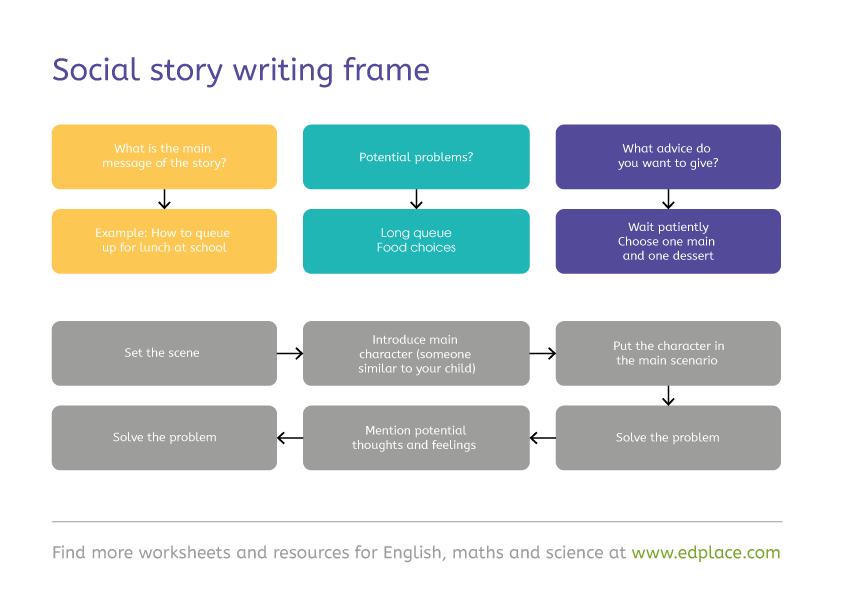Why is turn-taking important?
Turn-taking isn’t a natural skill for any child, yet it’s a life skill we need for social success in all environments. Children with ASD, OCD or FASD may face difficulties with appreciating the feelings of others or tolerating waiting times. This makes turn-taking harder. Being knowledgeable about a particular subject/toy may make them less willing to let others play with or talk about that toy/subject and an impairment with information processing will make verbal rules difficult to follow. Often preferring to play alone, these children may not get enough practice at turn-taking to improve their skills.
Specifically teaching turn-taking and offering plenty of practice to give children opportunities to successfully play with peers, is helpful with this. (See the EdPlace SEND hub for Games to encourage Social Interaction). Revisiting or reminding them about what to do in situations will reinforce these skills and will help them master the skills and understanding below:
Why do we share or take turns?
- Can I keep control when I have to wait my turn?
- What do I do when I’m waiting for my turn?
- When will I know it’s my turn?
- Playing games and turn-taking
Before playing together, talk with your child and describe a typical scenario/Social Story to introduce your play eg: say how you’re playing with toys and a friend and your friend wants to play with one of your toys. How are you feeling? How might your friend feel if
you refused to let them take a turn? What could you do? This analysis may provide a structure they can later apply when playing with peers.
Use our social story writing frame to help you create your own targeted and specific tale!
Download this social stories sheet and lots of other supportive resources here
Reinforcing learnt skills
Reinforce the idea of turn-taking in daily routines and use the vocabulary of turn-taking eg: “It’s my turn to put my coat on and now it’s your turn”. Use gestures and actions to reinforce the words. Talk about playing games, explaining they’ll have their turn but so will their friends. Explain they could maybe draw or use a ‘fiddle toy’ whilst they wait. Talk about how everyone feels when they get their turn. (See the EdPlace SEND hub for Social Stories). During the game, reinforce turn-taking vocabulary eg: “It’s my turn now”, “You wait while I take my turn and then it’s your turn”. Maybe use a colour coded ‘turn card’ that’ll show your child when it’s their turn. Moving the card/turning it over, highlights the reason why they’re doing this. Perhaps give your child a finger activity whilst they wait for their turn eg: a peg stick, bead string.

Turn-taking
Board games are predictable and have rules and this appeals to many children with additional needs. Revisit the rules before they play EVERY time. Start with games for two players so their turn comes around quicker and start by playing with an adult/older sibling.
Beginning with simple, visual games and those that involve spinning a wheel or throwing a die are good for turn-taking practice. Increase the number of players as your child improves their turn-taking skills. Remember to praise your child when they’re attempting to turn-take. Patience pays off!
Talking and turn-taking
Teaching social awareness to both verbal and non-verbal children so they can contribute their own ideas in an appropriate way will help. Turn-taking builds conversations. EdPlace suggests playing games, watching video clips and listening to others speak to demonstrate turn-taking in conversation. Personalise a Social Story for your child to match the scenario your child finds difficult eg: Circle Time in school, talking with siblings at dinnertime.
Highlight where we take turns in everyday life to show how common it is. Play a game where you say, “It’s my turn to ask a question,” and then you say, “It’s your turn to answer the question”. Watch tv programmes or films together and point out that characters are turn-taking when they talk. Highlight how they listen to each other and sometimes wait longer for a response to allow for thinking time.
Play ‘Show and Tell’ and use ‘turn cards’ at home to show that a person is talking and that others need to be listening and waiting. This may help siblings get their chance to talk and learn about turn-taking!
Using common visual supports/talking aids, like a ‘talking stick’, across activities and settings helps your child to apply the rules of turn-taking more quickly. Having a key ring with ‘turn cards’ in your pocket may also help to reinforce turn-taking in social situations
eg: when you’re queuing for a ticket, waiting in a restaurant. Model how to wait patiently yourself - this will help too!

How can EdPlace help?
EdPlace students progress by over 150% across English, maths and science over a school year. Help your child achieve their best through access to thousands of online worksheets, assessments and revision materials from year 1 to GCSE. EdPlace is the only online learning platform that has SEND accessibility options!











